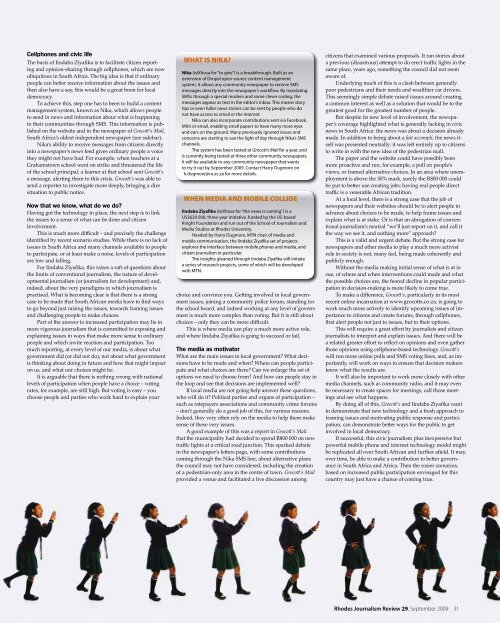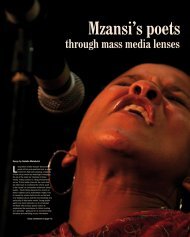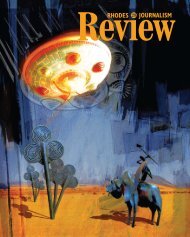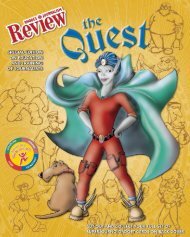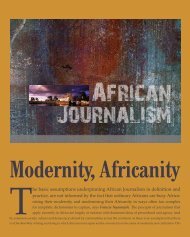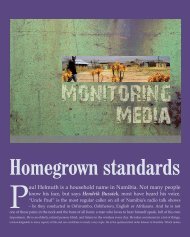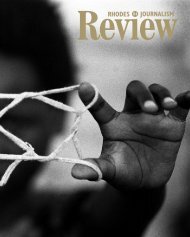Riding on the cup: - Rhodes Journalism Review - Rhodes University
Riding on the cup: - Rhodes Journalism Review - Rhodes University
Riding on the cup: - Rhodes Journalism Review - Rhodes University
Create successful ePaper yourself
Turn your PDF publications into a flip-book with our unique Google optimized e-Paper software.
Cellph<strong>on</strong>es and civic life<br />
The basis of Iindaba Ziyafika is to facilitate citizen reporting<br />
and opini<strong>on</strong>-sharing through cellph<strong>on</strong>es, which are now<br />
ubiquitous in South Africa. The big idea is that if ordinary<br />
people can better receive informati<strong>on</strong> about <strong>the</strong> issues and<br />
<strong>the</strong>n also have a say, this would be a great bo<strong>on</strong> for local<br />
democracy.<br />
To achieve this, step <strong>on</strong>e has to been to build a c<strong>on</strong>tent<br />
management system, known as Nika, which allows people<br />
to send in news and informati<strong>on</strong> about what is happening<br />
in <strong>the</strong>ir communities through SMS. This informati<strong>on</strong> is published<br />
<strong>on</strong> <strong>the</strong> website and in <strong>the</strong> newspaper of Grocott’s Mail,<br />
South Africa’s oldest independent newspaper (see sidebar).<br />
Nika’s ability to receive messages from citizens directly<br />
into a newspaper’s news feed gives ordinary people a voice<br />
<strong>the</strong>y might not have had. For example, when teachers at a<br />
Grahamstown school went <strong>on</strong> strike and threatened <strong>the</strong> life<br />
of <strong>the</strong> school principal, a learner at that school sent Grocott’s<br />
a message, alerting <strong>the</strong>m to this crisis. Grocott’s was able to<br />
send a reporter to investigate more deeply, bringing a dire<br />
situati<strong>on</strong> to public notice.<br />
Now that we know, what do we do?<br />
Having got <strong>the</strong> technology in place, <strong>the</strong> next step is to link<br />
<strong>the</strong> issues to a sense of what can be d<strong>on</strong>e and citizen<br />
involvement.<br />
This is much more difficult – and precisely <strong>the</strong> challenge<br />
identified by recent scenario studies. While <strong>the</strong>re is no lack of<br />
issues in South Africa and many channels available to people<br />
to participate, or at least make a noise, levels of participati<strong>on</strong><br />
are low and falling.<br />
For Iindaba Ziyafika, this raises a raft of questi<strong>on</strong>s about<br />
<strong>the</strong> limits of c<strong>on</strong>venti<strong>on</strong>al journalism, <strong>the</strong> nature of developmental<br />
journalism (or journalism for development) and,<br />
indeed, about <strong>the</strong> very paradigms in which journalism is<br />
practised. What is becoming clear is that <strong>the</strong>re is a str<strong>on</strong>g<br />
case to be made that South African media have to find ways<br />
to go bey<strong>on</strong>d just raising <strong>the</strong> issues, towards framing issues<br />
and challenging people to make choices.<br />
Part of <strong>the</strong> answer to increased participati<strong>on</strong> may lie in<br />
more vigorous journalism that is committed to exposing and<br />
explaining issues in ways that make more sense to ordinary<br />
people and which invite reacti<strong>on</strong> and participati<strong>on</strong>. Too<br />
much reporting, at every level of our media, is about what<br />
government did (or did not do), not about what government<br />
is thinking about doing in future and how that might impact<br />
<strong>on</strong> us, and what our choices might be.<br />
It is arguable that <strong>the</strong>re is nothing wr<strong>on</strong>g with nati<strong>on</strong>al<br />
levels of participati<strong>on</strong> when people have a choice – voting<br />
rates, for example, are still high. But voting is easy – you<br />
choose people and parties who work hard to explain your<br />
WhaT is nika?<br />
nika (isiXhosa for “to give”) is a breakthrough. Built as an<br />
extensi<strong>on</strong> of Drupal open-source c<strong>on</strong>tent management<br />
system, it allows any community newspaper to receive SMS<br />
messages directly into <strong>the</strong> newspaper’s workflow. By translating<br />
SMSs through a special modem and some clever coding, <strong>the</strong><br />
messages appear as text in <strong>the</strong> editor’s inbox. This means story<br />
tips or even fuller news stories can be sent by people who do<br />
not have access to email or <strong>the</strong> internet.<br />
Nika can also incorporate c<strong>on</strong>tributi<strong>on</strong>s sent via Facebook,<br />
MXit or email, enabling small papers to have many more eyes<br />
and ears <strong>on</strong> <strong>the</strong> ground. Many previously ignored issues and<br />
c<strong>on</strong>cerns are starting to see <strong>the</strong> light of day through Nika’s SMS<br />
channels.<br />
The system has been tested at Grocott’s Mail for a year, and<br />
is currently being tested at three o<strong>the</strong>r community newspapers.<br />
It will be available to any community newspaper that wants<br />
to try it out by September 2009. C<strong>on</strong>tact Harry Dugmore <strong>on</strong><br />
h.dugmore@ru.ac.za for more details.<br />
When media and mobile collide<br />
iindaba Ziyafika (isiXhosa for “<strong>the</strong> news is coming”) is a<br />
US$620 000, three-year initiative, funded by <strong>the</strong> US-based<br />
Knight Foundati<strong>on</strong> and run out of <strong>the</strong> School of <strong>Journalism</strong> and<br />
Media Studies at <strong>Rhodes</strong> <strong>University</strong>.<br />
Headed by Harry Dugmore, MTN chair of media and<br />
mobile communicati<strong>on</strong>, <strong>the</strong> Iindaba Ziyafika set of projects<br />
explores <strong>the</strong> interface between mobile ph<strong>on</strong>es and media, and<br />
citizen journalism in particular.<br />
The insights gleaned through Iindaba Ziyafika will initiate<br />
a series of research projects, some of which will be developed<br />
with MTN.<br />
choice and c<strong>on</strong>vince you. Getting involved in local government<br />
issues, joining a community police forum, standing for<br />
<strong>the</strong> school board, and indeed working at any level of government<br />
is much more complex than voting. But it is still about<br />
choices – <strong>on</strong>ly <strong>the</strong>y can be more difficult.<br />
This is where media can play a much more active role,<br />
and where Iindaba Ziyafika is going to succeed or fail.<br />
The media as motivator<br />
What are <strong>the</strong> main issues in local government? What decisi<strong>on</strong>s<br />
have to be made and when? Where can people participate<br />
and what choices are <strong>the</strong>re? Can we enlarge <strong>the</strong> set of<br />
opti<strong>on</strong>s we need to choose from? And how can people stay in<br />
<strong>the</strong> loop and see that decisi<strong>on</strong>s are implemented well?<br />
If local media are not going help answer <strong>the</strong>se questi<strong>on</strong>s,<br />
who will do it? Political parties and organs of participati<strong>on</strong> –<br />
such as ratepayers associati<strong>on</strong>s and community crime forums<br />
– d<strong>on</strong>’t generally do a good job of this, for various reas<strong>on</strong>s.<br />
Indeed, <strong>the</strong>y very often rely <strong>on</strong> <strong>the</strong> media to help <strong>the</strong>m make<br />
sense of <strong>the</strong>se very issues.<br />
A good example of this was a report in Grocott’s Mail<br />
that <strong>the</strong> municipality had decided to spend R800 000 <strong>on</strong> new<br />
traffic lights at a critical road juncti<strong>on</strong>. This sparked debate<br />
in <strong>the</strong> newspaper’s letters page, with some c<strong>on</strong>tributi<strong>on</strong>s<br />
coming through <strong>the</strong> Nika SMS line, about alternative plans<br />
<strong>the</strong> council may not have c<strong>on</strong>sidered, including <strong>the</strong> creati<strong>on</strong><br />
of a pedestrian-<strong>on</strong>ly area in <strong>the</strong> centre of town. Grocott’s Mail<br />
provided a venue and facilitated a live discussi<strong>on</strong> am<strong>on</strong>g<br />
citizens that examined various proposals. It ran stories about<br />
a previous (disastrous) attempt to do erect traffic lights in <strong>the</strong><br />
same place, years ago, something <strong>the</strong> council did not seem<br />
aware of.<br />
Underlying much of this is a clash between generally<br />
poor pedestrians and <strong>the</strong>ir needs and wealthier car drivers.<br />
This seemingly simple debate raised issues around creating<br />
a comm<strong>on</strong> interest as well as a soluti<strong>on</strong> that would be to <strong>the</strong><br />
greatest good for <strong>the</strong> greatest number of people.<br />
But despite its new level of involvement, <strong>the</strong> newspaper’s<br />
coverage highlighted what is generally lacking in civic<br />
news in South Africa: <strong>the</strong> news was about a decisi<strong>on</strong> already<br />
made. In additi<strong>on</strong> to being about a fait accompli, <strong>the</strong> news itself<br />
was presented neutrally: it was left entirely up to citizens<br />
to write in with <strong>the</strong> new idea of <strong>the</strong> pedestrian mall.<br />
The paper and <strong>the</strong> website could have possibly been<br />
more proactive and run, for example, a poll <strong>on</strong> people’s<br />
views, or framed alternative choices. In an area where unemployment<br />
is above <strong>the</strong> 50% mark, surely <strong>the</strong> R800 000 could<br />
be put to better use creating jobs: having real people direct<br />
traffic is a venerable African traditi<strong>on</strong>.<br />
At a local level, <strong>the</strong>re is a str<strong>on</strong>g case that <strong>the</strong> job of<br />
newspapers and <strong>the</strong>ir websites should be to alert people in<br />
advance about choices to be made, to help frame issues and<br />
explain what is at stake. Or is that an abrogati<strong>on</strong> of c<strong>on</strong>venti<strong>on</strong>al<br />
journalism’s neutral “we’ll just report <strong>on</strong> it, and call it<br />
<strong>the</strong> way we see it, and nothing more” approach?<br />
This is a valid and urgent debate. But <strong>the</strong> str<strong>on</strong>g case for<br />
newspapers and o<strong>the</strong>r media to play a much more activist<br />
role in society is not, many feel, being made coherently and<br />
publicly enough.<br />
Without <strong>the</strong> media making initial sense of what is at issue,<br />
of where and when interventi<strong>on</strong>s could made and what<br />
<strong>the</strong> possible choices are, <strong>the</strong> feared decline in popular participati<strong>on</strong><br />
in decisi<strong>on</strong>-making is more likely to come true.<br />
To make a difference, Grocott’s, particularly in its most<br />
recent <strong>on</strong>line incarnati<strong>on</strong> at www.grocotts.co.za, is going to<br />
work much more actively to identify upcoming issues of importance<br />
to citizens and create forums, through cellph<strong>on</strong>es,<br />
that alert people not just to issues, but to <strong>the</strong>ir opti<strong>on</strong>s.<br />
This will require a great effort by journalists and citizen<br />
journalists to interpret and explain issues. And <strong>the</strong>re will be<br />
a related greater effort to reflect <strong>on</strong> opini<strong>on</strong>s and even ga<strong>the</strong>r<br />
those opini<strong>on</strong>s using cellph<strong>on</strong>e-based technology. Grocott’s<br />
will run more <strong>on</strong>line polls and SMS voting lines, and, as importantly,<br />
will work <strong>on</strong> ways to ensure that decisi<strong>on</strong> makers<br />
know what <strong>the</strong> results are.<br />
It will also be important to work more closely with o<strong>the</strong>r<br />
media channels, such as community radio, and it may even<br />
be necessary to create spaces for meetings, call those meetings<br />
and see what happens.<br />
By doing all of this, Grocott’s and Iindaba Ziyafika want<br />
to dem<strong>on</strong>strate that new technology and a fresh approach to<br />
framing issues and motivating public resp<strong>on</strong>se and participati<strong>on</strong>,<br />
can dem<strong>on</strong>strate better ways for <strong>the</strong> public to get<br />
involved in local democracy.<br />
If successful, this civic journalism plus inexpensive but<br />
powerful mobile ph<strong>on</strong>e and internet technology model might<br />
be replicated all over South African and fur<strong>the</strong>r afield. It may,<br />
over time, be able to make a c<strong>on</strong>tributi<strong>on</strong> to better governance<br />
in South Africa and Africa. Then <strong>the</strong> rosier scenarios,<br />
based <strong>on</strong> increased public participati<strong>on</strong> envisaged for this<br />
country may just have a chance of coming true.<br />
<strong>Rhodes</strong> <strong>Journalism</strong> <strong>Review</strong> 29, september 2009 31


